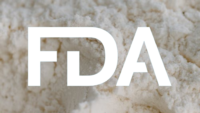FDA Releases Strategy to Increase Resilience of U.S. Infant Formula Market; Officials Express Uncertainty in House Subcommittee Hearing

Credit: Joshua Sukoff, FDA
On March 28, 2023, the U.S. Food and Drug Administration (FDA) released an Immediate National Strategy to Increase the Resiliency of the U.S. Infant Formula Market. On the same day, the agency’s response to the recent infant formula safety and supply crisis was called into question during a hearing with the U.S. House of Representatives Subcommittee on Health Care and Financial Services Hearing.
The strategy and hearing follow a months-long infant formula shortage beginning in February 2022, sparked by insanitary conditions at one of the nation’s largest infant formula facilities, leading to a significant voluntary recall and production shutdown.
As directed by U.S. Congress in the Food and Drug Omnibus Reform Act of 2022, the national strategy describes immediate actions FDA has taken to address the infant formula shortage and details the agency’s plans for improving the resiliency of the infant formula supply, while noting multiple issues beyond the purview of the FDA. It also traces the events that led up to and followed the voluntary recall of infant formula by Abbott Nutrition in February 2022, the temporary pause in production at the facility in Sturgis, Michigan, and pantry loading that peaked in May 2022.
Key elements of the immediate strategy, which is already underway, include:
- Ensuring industry is aware of requirements to develop and implement redundancy risk management plans, which are intended to help industry identify risks to the supply chains of infant formula and medical foods and to develop mitigation plans against potential disruptions that could impact production
- Continuing to enhance inspections of infant formula manufacturers, including by expanding and improving infant formula training for investigators
- Expediting review of premarket submissions for new infant formula products to mitigate or prevent shortages
- Continuing to monitor the infant formula supply and developing a forecasting model to enable FDA to prepare for and mitigate future supply disruptions
- Engaging with U.S. government partners who play a role in mitigating other factors that may influence the infant formula supply, such as tariffs and market concentration, to sustain the safe, continuous production of infant formula
- Engaging with the U.S. Department of Agriculture (USDA) to support efforts to build resiliency within its Special Supplemental Nutrition Program for Women, Infants, and Children (WIC)
- Continuing to advance the agency’s Strategy to Help Prevent Cronobacter sakazakii Illnesses Associated with Consumption of Powdered Infant Formula
- Improving the agency’s consumer education materials relating to infant formula on FDA.gov
- Enhancing and leveraging FDA’s partnerships with health care providers and professionals, particularly infant care professionals, to further expand the agency’s consumer education program.
Points set forth in the strategy were echoed by FDA’s recently resigned Deputy Commissioner for Food Policy and Response, Frank Yiannas, who was a top official at the agency during the infant formula crisis. While Mr. Yiannas expressed that Abbott Nutrition “bears the primary responsibility for this crisis,” the siloed nature of FDA’s Foods Program greatly affected the agency’s ability to effectively diffuse the situation. He explained that, although a whistleblower brought the insanitary conditions of Abbott Nutrition’s Sturgis, Michigan facility to FDA’s attention, and the agency was notified of several infant Cronobacter sakazakii illnesses, FDA did not launch an official investigation until January 2022, despite the agency being alerted to the growing problem in September 2021. Mr. Yiannas himself was not made aware of the problem until February 10, 2022, and Abbott Nutrition issued its voluntary recall on February 17, 2022. “Had the agency responded more quickly to some of the earlier signals, I believe this crisis could have been averted, or at least the magnitude lessened,” Mr. Yiannas stated.
According to Mr. Yiannas, despite the agency’s, the media’s, and the federal government’s best attempts to understand what precipitated the infant formula crisis over the past year, there is still “no clear understanding of what took place and the contributing factors that allowed it to occur remain elusive.” He continued, “It is my view, that the state of the infant formula industry today is not much different than it was then. The public health surveillance system for [Cronobacter sakazakii] remain insufficient, the necessary safeguards have not been advanced at an adequate pace to prevent future illnesses, and the infant formula supply chain continues to lack serious resilience. In other words, the nation remains one outbreak, tornado, flood, or cyber-attack away from finding itself in a similar place to that of February 17, 2022.”
Also questioned during the hearing was the Executive Director of the Center for Science in the Public Interest (CSPI), Peter Lurie, M.D., M.P.H. Like Mr. Yiannas, Dr. Lurie expressed that, if any blame is to be apportioned for the infant formula crisis, it should be directed at Abbott Nutrition for its failure to uphold food safe conditions at its Sturgis, Michigan facility and the company’s attempts to brush the presence of Cronobacter sakazakii at the facility under the rug. Although “much of FDA’s response was entirely appropriate,” Dr. Lurie stated, listing the measures that the agency took to address the crisis, “in other respects, FDA’s performance failed to live up to the high standards that American consumers expect and deserve.” He explained that better crisis prevention and response in the future will require at least three elements—better authorities, increased funding, and an improved organizational structure.
Specifically, Dr. Lurie believes FDA needs authorities beyond those outlined in the Food and Drug Omnibus Reform Act of 2022, such as the authorities to require manufacturers to notify the agency of all positive microbiological test results, and to mandate more frequent environmental testing at manufacturing facilities. FDA should also be able to compel manufacturers to submit supply chain data, and, although an issue beyond FDA’s scope, Cronobacter sakazakii should be made a nationally notifiable disease. Additionally, regarding improvements to FDA’s organizational structure, Dr. Lurie believes that the plans outlined by FDA Commissioner Robert M. Califf, M.D. are an important first step that encompass the recommendations of the Reagan-Udall Foundation.
With input from the National Academy of Science, Engineering and Medicine (NASEM), the strategy represents a first step toward issuing a long-term national strategy in 2024 to improve preparedness against infant formula shortages by outlining methods to improve information-sharing, recommending measures for protecting the integrity of the infant formula supply chain, and preventing contamination. The long-term strategy will also explore new approaches to help facilitate entry of new infant formula manufacturers to increase supply and mitigate future shortages and recommend other necessary authorities to gain insight into the supply chain and risks for shortages.
Looking for a reprint of this article?
From high-res PDFs to custom plaques, order your copy today!







